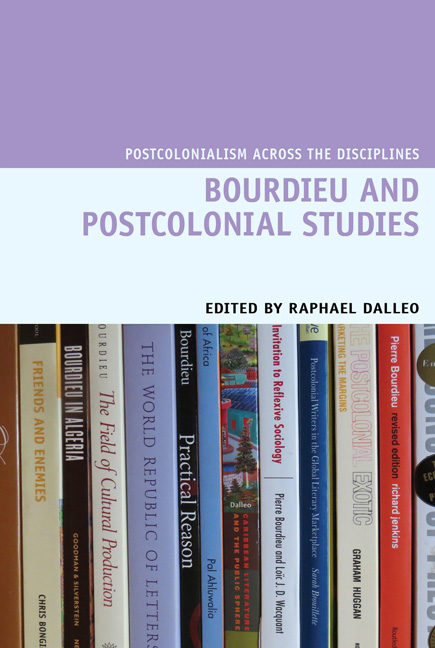Book contents
- Frontmatter
- Contents
- Permissions
- Introduction
- 1 Writing at the Margins: Postcolonialism, Exoticism and the Politics of Cultural Value (from The Postcolonial Exotic)
- 2 Exiles on Main Stream: Valuing the Popularity of Postcolonial Literature (from Friends and Enemies)
- 3 Postcolonial Authorship Revisited (from Postcolonial Writers in the Global Literary Marketplace)
- 4 Bourdieu and Fanon on Algeria
- 5 Style as Habitus: World Literature, Decolonization and Caribbean Voices
- 6 Playing the Game? The Publication of Oswald Mtshali
- 7 Fields in Formation: English Studies and National Literature in South Africa (with a Brazilian Comparison)
- 8 Archived Relationships: Pierre Bourdieu and Writers of the Caribbean Diaspora
- 9 Irony in the Dungeon: Anamnesis and Emancipation
- About the Contributors
- Index
5 - Style as Habitus: World Literature, Decolonization and Caribbean Voices
- Frontmatter
- Contents
- Permissions
- Introduction
- 1 Writing at the Margins: Postcolonialism, Exoticism and the Politics of Cultural Value (from The Postcolonial Exotic)
- 2 Exiles on Main Stream: Valuing the Popularity of Postcolonial Literature (from Friends and Enemies)
- 3 Postcolonial Authorship Revisited (from Postcolonial Writers in the Global Literary Marketplace)
- 4 Bourdieu and Fanon on Algeria
- 5 Style as Habitus: World Literature, Decolonization and Caribbean Voices
- 6 Playing the Game? The Publication of Oswald Mtshali
- 7 Fields in Formation: English Studies and National Literature in South Africa (with a Brazilian Comparison)
- 8 Archived Relationships: Pierre Bourdieu and Writers of the Caribbean Diaspora
- 9 Irony in the Dungeon: Anamnesis and Emancipation
- About the Contributors
- Index
Summary
Since the turn of the century, the field of postcolonial studies has seen its disciplinary protocols and critical presuppositions shaken by political and economic changes in the world-system. The renewed visibility and intensity of imperialism—signalled most starkly, post-9/11, by the US-led occupation and pillage of Afghanistan and Iraq—has had an especially sharp impact on work produced in the field. Thus, the editors of Postcolonial Studies and Beyond, published in 2005, open their volume with the observation that: ‘The shadow the 2003 US invasion of Iraq casts on the twenty-first century makes it more absurd than ever to speak of ours as a postcolonial world. On the other hand, the signs of galloping US imperialism make the agenda of postcolonial studies more necessary than ever’ (Loomba et al. 1). While dissenting from the editors’ claims regarding the efficacy of the concepts, theories and methods hitherto dominant in the field, Neil Lazarus suggests that they are nevertheless ‘correct to insist that the “urgent” task facing those in [postcolonial studies] today, in the wake of the invasion, occupation and, evidently, the long-term destabilization of Iraq, is to take central cognisance of the unremitting actuality and indeed the intensification of imperialist social relations in the times and spaces of the postcolonial world’ (2011a, 17). Lazarus himself has been at the forefront of the ‘concerted materialist critique [that] has arisen of the epistemological and ideological tendencies that have been foremost in postcolonial studies from the time of its initial consolidation as an academic field’ (2011a, 21). Among other things, this critique has highlighted the field's over-reliance on a handful of consecrated authors and its lack of attention to new forms of capitalist domination.
The turbulence in postcolonial studies is tied to a more general tumult in literary studies, the received methods and procedures of which have, in recent years, come to be seen as in crisis. The reasons adduced for this crisis are numerous, but ‘globalization’ is often identified as a kind of master-process determining a range of destabilizing factors. In this context, the concept of world literature has (re)emerged as an important battleground in arguments over the reinvention of the discipline. One of the most significant interventions in the field has been Franco Moretti's ‘Conjectures on World Literature’ (2000).
- Type
- Chapter
- Information
- Bourdieu and Postcolonial Studies , pp. 119 - 136Publisher: Liverpool University PressPrint publication year: 2016

